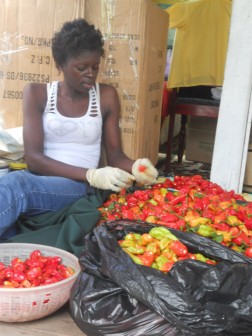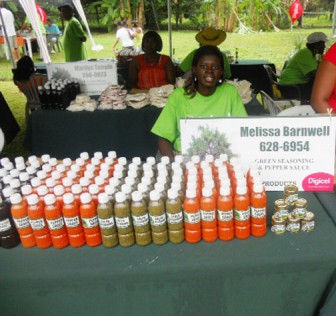Melissa Barnwell is obsessed with the idea that she is destined to become a successful entrepreneur.
Eight years ago she resigned from her job as manager of a lumber yard on the East Coast Demerara to immerse herself in the pursuit of agro processing.
As a child she had been taught to mix and blend the various seasonings that have done much to enhance the reputation of Guyanese and Caribbean cooking. She talks enthusiastically about watching her grandfather crushing the various herbs and spices that comprise the seasonings and finally arrived at a point in her own life when she decided that she would turn a domestic pursuit into an entrepreneurial enterprise.
Pepper sauces have been one of the major success stories of the local agro-processing sector. Several brands have found their way onto the shelves of supermarkets in the Caribbean and Melissa’s brand, Savory appears ready to make its mark on the local market. She has worked at it for eight years at home in Victoria; her earliest efforts a far cry from the rigorous standards which the contemporary market now requires. Producing five-gallon plastic pails of pepper sauce in the absence of the factory-type blending equipment necessary for such a pursuit was an onerous task. She persisted, however, because it was worth the while. A contact in Canada had opened a market for her and the product went quickly. The buyer bought and exported and repackaged her pepper. The market persisted for more than two years.

Smaller local orders helped to sustain her. First, there was the pepper sauce. After that her passion for blending seasonings and experimenting with colour and taste led to other food-seasoning products. But the agro-processing industry was growing, the demands extending far beyond pale of seasonings ladled into recycled jam jars and Melissa knew that if her products were to ‘make’ the local supermarket shelves, far less the export market, she had to invest in higher standards.
Financing the quantum leap from a cottage industry to a competitive enterprise has been an age-old problem in the local agro-processing sector. The vast majority of local agro-processing enterprises have had their origins in congested kitchens and small, sub-standard factories. In their infancy they have taken little account of issues of product consistency, packaging and labelling and, perhaps above all else the rigorous health and sanitation requirements that have locked their products out of foreign markets. More than that, attracting the necessary financing for ventures which often appear worryingly unsustainable is a perpetual challenge. Local commercial banks have traditionally ‘run a mile’ from such ventures.
There is another consideration that makes lending agencies cautious. Owners of small cottage industries frequently display far more enthusiasm than business acumen and that, has often been a recipe for failure.

Eight years into her business pursuit, Melissa is still learning but she is learning quickly. She has taken advantage of institutions like the Institute of Private Enterprise Development (IPED) where, apart from having participated in business training she has benefited from a small business loan from the institution.
Over time, she has developed the makings of modest factory that includes two heavy duty blenders. The factory has the capacity to grind around 100 pounds of pepper in half an hour. Her operation has also passed the local sanitation and safety tests though she still believes that it is a work in progress.
Her confidence in her production process and her product quality is now complete and her current focus is on the business end of her enterprise. She talks about the fluctuating price of peppers and the impact on her ability to sustain a competitive price for her finished product. In response to that concern she has already created a nursery. By next April she expects to be producing at least some of the supplies that she needs for her manufacturing pursuits.
Months of diligent research have now taken her to a point where labelling and packaging have reached a standard which she feels can allow Savory products access to the shelves of local supermarkets. With Christmas now only a matter of a few weeks away her focus is on pursuing product promotion at the major retail outlets. Apart from at least two flavors of pepper sauce and a seasoning mix she has launched a new product, a pepperpot sauce, casareep blended with the various other seasonings used in the cooking of Guyana’s most popular seasonal dish. The new product has derived from an experiment undertaken last year to facilitate friends in Barbados seeking a simple way to create the popular local dish.
In recent months she has had some modest marketing accomplishments. Her affiliation with the national mangrove project has won her a useful market, while the Mangrove Visitors Centre at Cove and John has already afforded her the opportunity to become involved in a farmers’ market.
Melissa’s immediate goal is to maximize seasonal sales of her products. After that she wants to focus on the export market; the Caribbean and possibly Canada are immediate targets. She is, however, under no illusions as to what it will take to secure those external markets. She is already enquiring about the new, wide-ranging health and food safety regulations enacted by the United States government and the costs and administrative work associated with meeting those requirements. That apart she is toying with new, more attractive packaging and labelling, all the time contemplating the costs of those pursuits.
In the process she has already been speaking with an associate in Miami who has undertaken to do the research in the packaging standards that could match imports into North America from Asia. Melissa told Stabroek Business that her preparation for the export market includes seeking to engage the Guyana Manu-facturing and Services Association (GMSA) and accessing such training programmes as are available on local and international food standards and packaging and labelling for export.
After eight years Melissa still does not exude a feeling of having arrived in the agro processing sector. You get the impression, however, that she believes she has come too far not to continue to press on until she reaches that goal.




